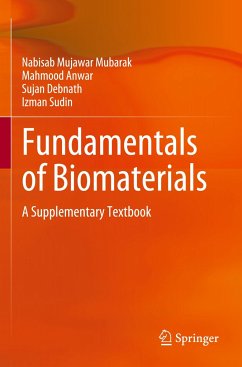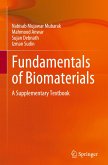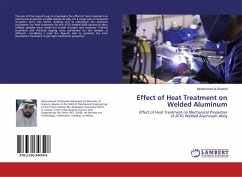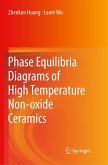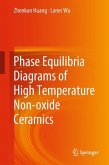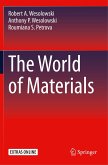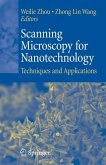Nabisab Mujawar Mubarak, Mahmood Anwar, Sujan Debnath
Fundamentals of Biomaterials
A Supplementary Textbook
Nabisab Mujawar Mubarak, Mahmood Anwar, Sujan Debnath
Fundamentals of Biomaterials
A Supplementary Textbook
- Broschiertes Buch
- Merkliste
- Auf die Merkliste
- Bewerten Bewerten
- Teilen
- Produkt teilen
- Produkterinnerung
- Produkterinnerung
This book encompasses Materials Engineering with Medical Science which introduces the depth of knowledge from beginning with relevant fundamentals. This book fills the void which comprises a broad range of Materials Engineering with Medical science, from atomic physics to histology. This book greatly benefits towards those engineering students who are least familiar with biological science as well as medical science.
Andere Kunden interessierten sich auch für
![Fundamentals of Biomaterials Fundamentals of Biomaterials]() Nabisab Mujawar MubarakFundamentals of Biomaterials63,99 €
Nabisab Mujawar MubarakFundamentals of Biomaterials63,99 €![Effect of Heat Treatment on Welded Aluminum Effect of Heat Treatment on Welded Aluminum]() Mohammed Al-GhamdiEffect of Heat Treatment on Welded Aluminum23,99 €
Mohammed Al-GhamdiEffect of Heat Treatment on Welded Aluminum23,99 €![Biomaterials as Green Flame Retardants Biomaterials as Green Flame Retardants]() Biomaterials as Green Flame Retardants146,99 €
Biomaterials as Green Flame Retardants146,99 €![Phase Equilibria Diagrams of High Temperature Non-oxide Ceramics Phase Equilibria Diagrams of High Temperature Non-oxide Ceramics]() Zhenkun HuangPhase Equilibria Diagrams of High Temperature Non-oxide Ceramics37,99 €
Zhenkun HuangPhase Equilibria Diagrams of High Temperature Non-oxide Ceramics37,99 €![Phase Equilibria Diagrams of High Temperature Non-oxide Ceramics Phase Equilibria Diagrams of High Temperature Non-oxide Ceramics]() Zhenkun HuangPhase Equilibria Diagrams of High Temperature Non-oxide Ceramics52,99 €
Zhenkun HuangPhase Equilibria Diagrams of High Temperature Non-oxide Ceramics52,99 €![The World of Materials The World of Materials]() Robert A. WesolowskiThe World of Materials81,99 €
Robert A. WesolowskiThe World of Materials81,99 €![Scanning Microscopy for Nanotechnology Scanning Microscopy for Nanotechnology]() Scanning Microscopy for Nanotechnology191,99 €
Scanning Microscopy for Nanotechnology191,99 €-
-
-
This book encompasses Materials Engineering with Medical Science which introduces the depth of knowledge from beginning with relevant fundamentals. This book fills the void which comprises a broad range of Materials Engineering with Medical science, from atomic physics to histology. This book greatly benefits towards those engineering students who are least familiar with biological science as well as medical science.
Produktdetails
- Produktdetails
- Verlag: Springer / Springer Nature Singapore / Springer, Berlin
- Artikelnr. des Verlages: 978-981-19-9302-2
- 2023
- Seitenzahl: 160
- Erscheinungstermin: 15. März 2024
- Englisch
- Abmessung: 235mm x 155mm x 9mm
- Gewicht: 254g
- ISBN-13: 9789811993022
- ISBN-10: 9811993025
- Artikelnr.: 69995770
- Herstellerkennzeichnung Die Herstellerinformationen sind derzeit nicht verfügbar.
- Verlag: Springer / Springer Nature Singapore / Springer, Berlin
- Artikelnr. des Verlages: 978-981-19-9302-2
- 2023
- Seitenzahl: 160
- Erscheinungstermin: 15. März 2024
- Englisch
- Abmessung: 235mm x 155mm x 9mm
- Gewicht: 254g
- ISBN-13: 9789811993022
- ISBN-10: 9811993025
- Artikelnr.: 69995770
- Herstellerkennzeichnung Die Herstellerinformationen sind derzeit nicht verfügbar.
Dr. Nabisab Mujawar Mubarak is an associate professor in the Faculty of Engineering, Universiti Teknologi Brunei, Brunei Darussalam. He serves as a scientific reviewer in numerous chemical engineering and nanotechnology journals. In research, he has published more than 270 journal papers, 30 conference proceedings and authored 30 book chapters, and the H-index is 52. His interest areas are carbon nanomaterials synthesis, magnetic biochar production using microwave and wastewater treatment using advanced materials. He is a recipient of the Curtin Malaysia Most Productive Research Award, Outstanding Faculty of Chemical Engineering Award, Best Scientific Research Award London and an exceptional scientist in publication and citation by i-Proclaim, Malaysia. He also has the distinction of being listed in the top two per cent of the world's most influential scientists in chemicals and energy. The List of the Top 2% Scientists in the World compiled and published by Stanford University isbased on their international scientific publications, a number of scientific citations for research and participation in the review and editing of scientific research. He is a fellow member of the Institution of Engineers, Australia, a chartered professional engineer (CPEng) of The Institution of Engineers, Australia, and a chartered chemical engineer of the Institute of Chemical Engineering (IChemE), UK. He has published four books and is the co-editor for ongoing Elsevier-edited books: 1) Nanomaterials for Carbon Capture and Conversion Technique, 2) Advanced Nanomaterials and Nanocomposites for Bioelectrochemical Systems, 3). Water Treatment Using Engineered Carbon Nanotubes and 4) Emerging Water Pollutants: Concerns and Remediation Technologies. Dr. Mahmood Anwar is a senior lecturer in the Department of Mechanical Engineering, Curtin University, Sarawak Campus, Malaysia. Prior to join academic position, he was a research scientist in Hitachi CFP PTE, Singapore, and involved as a lead scientist for high-voltage component research and corrosion protection projects. Currently, he is leading nanomaterials research for developing corrosion resistive high-voltage conductor. He is also the technical advisor of several palm oil industries for acoustic material design. Recently, he has been invited to join Coating Standard Development with IMM Coating Fingerprint Taskforce for Oil & Gas Industry. He is also a professional certified coating quality controller for Oil & Gas Industry. Currently, he is serving as a member in Committee for Standard Development on Nanotechnology, Advanced Ceramics and Metallic & Inorganic Coatings Division of ASTM (American Society for Testing and Materials). He has published more than 23 research papers up to date including journals and international conferences. He is holding one Malaysian patent which is under filingprocess. He is very active in industrial research and academic accreditation works, serving as an auditor for numerous academic programme. Due to his industrial research contribution, he has been awarded Fellow of Institute of Materials, Malaysia. He has been also awarded prestigious Fellow of Higher Education Academy (UK) due to his contribution to Engineering Education. Dr. Sujan (C.Eng. MIMechE, FHEA) is an associate professor at the Department of Mechanical Engineering in Curtin University Malaysia. He had served as the HOD of Mechanical Engineering from October 2014 to December 2017 in Curtin Malaysia. He obtained his Ph.D. degree from the University of Science Malaysia in 2006 majoring applied mechanics and heat transfer with specific research focuses on interfacial thermal mismatch stress analysis in electronic packaging. Over the years, he has been working in the areas of thermal management in electronic packaging, green composite materials using bio-waste, nanopolymer composites and nano-enhanced MQL machining. He has more than 100 publications in reputable international journals and conference proceedings. He is a chartered engineer (C.Eng. MIMechE) and a fellow of Advance Higher Learning (HEA), UK. He is a registered level 1 supervisor in Curtin University, Australia, for doctoral and master thesis. Prof. Dr. Izman is one of the country's leading figures in biomanufacturing engineering research. He set up the Medical Devices & Technology Group (MEDITEG) in 2006, and within a span of six years, the group that he pioneered secured 60 research projects with a total grant close to RM1 million. He has published over 70 papers internationally refereed indexed journals with a cumulative impact factor of 222.025. For academic teaching, he developed and taught four new courses: biomechanics, biomedical materials, biomedical engineering design, and tissue engineering. Other courses that he taught include materials science, advanced materials, materials technology, engineering drawing, and experimental techniques. He has successfully supervised 21 Ph.D. and 32 master's degree students. He has three patents (one granted, two under filing process).
Chapter 1: Introduction.- Chapter 2: Atomic Structure & Quantum Mechanics.- Chapter 3: Crystallography.- Chapter 4: Periodic Table.- Chapter 5: Basic Materials Science.- Chapter 6: Phase Diagram.- Chapter 7: Heat Treatment.- Chapter 8: Surface Engineering & Metallography.- Chapter 9: Corrosion Engineering and Biocorrosion.- Chapter 10: Materials Characterization.- Chapter 11: Mechanical Testing.- Chapter 12: Engineering Materials Selection.- Chapter 13: Solution Chemistry and Chemical Reaction.- Chapter 14: Basic Biology: Cell.- Chapter 15: Human Anatomy
Chapter 1: Introduction.- Chapter 2: Atomic Structure & Quantum Mechanics.- Chapter 3: Crystallography.- Chapter 4: Periodic Table.- Chapter 5: Basic Materials Science.- Chapter 6: Phase Diagram.- Chapter 7: Heat Treatment.- Chapter 8: Surface Engineering & Metallography.- Chapter 9: Corrosion Engineering and Biocorrosion.- Chapter 10: Materials Characterization.- Chapter 11: Mechanical Testing.- Chapter 12: Engineering Materials Selection.- Chapter 13: Solution Chemistry and Chemical Reaction.- Chapter 14: Basic Biology: Cell.- Chapter 15: Human Anatomy

